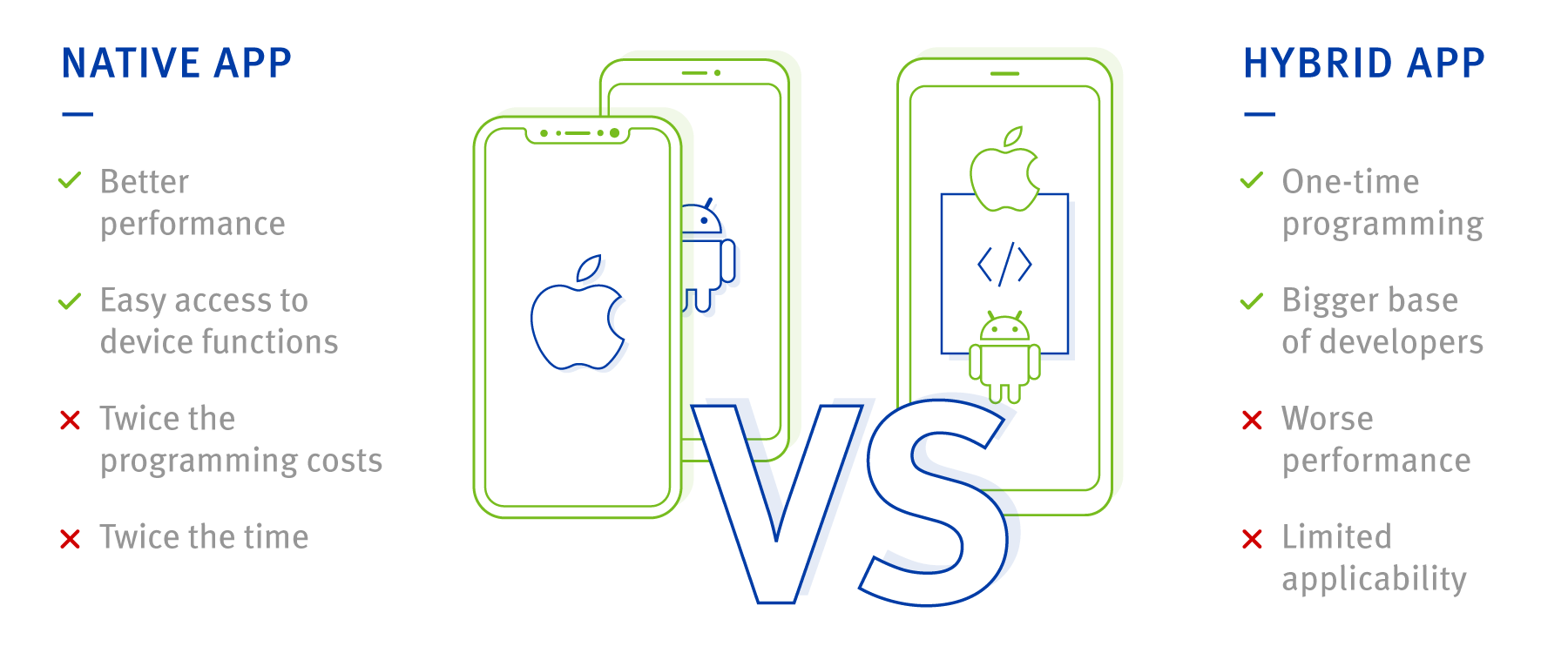Native Apps vs. Hybrid Apps: How To Find The Right Decision
First of all: there is no real winner in the competition native apps vs. hybrid apps. Like many things in technology, both have their advantages and disadvantages. As so often it depends on what the app is supposed to be able to do. This blog post is intended to compare the most important points and to help you make a decision.
Differences between native apps and hybrid apps
A native app is only programmed for one operating system. For Android you use Android Studio and for iOS, Xcode. A hybrid app, on the other hand, is an application that is programmed once and can then be used for several platforms such as Android, iOS, or even desktop. To use the code for both platforms, an abstraction layer is needed. This is the hybrid part of the app. The underlying part, the native part, is exchanged for the particular operating system.
Advantages of native apps
A native app always performs better. Especially if you have graphics-oriented apps, a hybrid version would be considerably slower. Another advantage is the easier access to functions such as camera, fingerprint etc., as these are already provided in the development environment. Therefore you are independent from external plugins. If you don’t want to develop native apps yourself, you are welcome to contact our experts for IOS native app development and Android native app development.
Advantages of hybrid apps
Hybrid apps have the advantage that you have to develop them only once and can then deploy them to different platforms. In addition, the development team is smaller and therefore you can get ahead faster. This saves you both time and money.
The use of common programming languages also has a positive effect. This opens up a bigger pool of developers who can work on the project. Your company then has more room to find suitable developers. Our experts are also available for hybrid app development.
Disadvantages of native apps
The two biggest disadvantages are time and money. You have to program a separate app for each operating system (iOS and Android), which takes twice the time. This also applies to any feature that is added afterwards. This doubles the amount of time and costs.
Disadvantages of hybrid apps
In general, you will have a problem with hybrid apps if you do not program properly. The performance is already impaired (latency) by the intermediate language, with which the hybrid layer is programmed.If the rest of the code is programmed poorly as well, the whole construct becomes unstable.
Because of the latency caused by the abstraction layer, it is not recommended to program a game as a hybrid app. This would result in too many complex calculations which would affect performance too much.
What do I have to pay attention to when programming a native app?
Basically, as with any program, you have to make sure that you build in error handling. Otherwise the app could simply crash. Of course, the “look and feel” of the respective platform must not be lost. This means that no iOS buttons are used in an Android app, or no Android menu is used in an iOS app.
What do I have to pay attention to when programming a hybrid app?
When programming a hybrid app, the frameworks already do most of the work for you in terms of platform differences. Nevertheless it doesn’t hurt to know the different finesses of the platforms, especially in the user experience. From a performance point of view, games or other computing-intensive apps should be developed natively, since the hybrid layer affects the performance.
Depending on the usage of the app, there are advantages and disadvantages of hybrid or native apps. Hybrid apps have developed strongly in the last years. The disadvantage of latency could also become negligible in the coming years. But this does not make up for the differences in user experience between iOS and Android. Anexia developers Sven and Alexandra are talking in more detail about this topic in a video with trendingtopics.at:
https://www.facebook.com/trendingtopics.at/videos/445559379726885/
More information about mobile app development.
